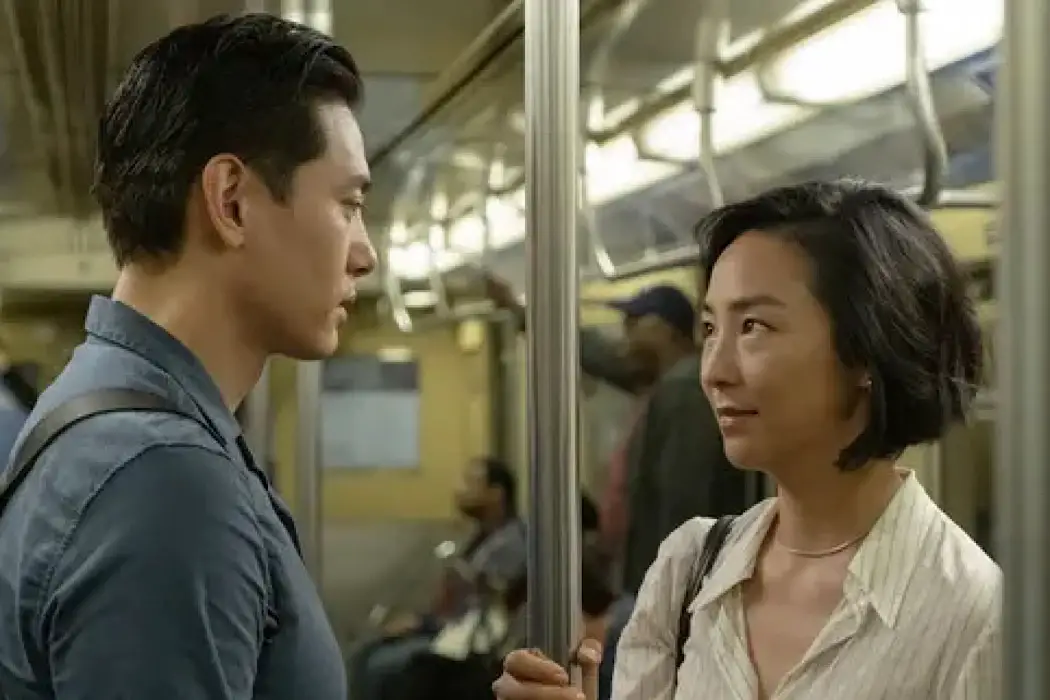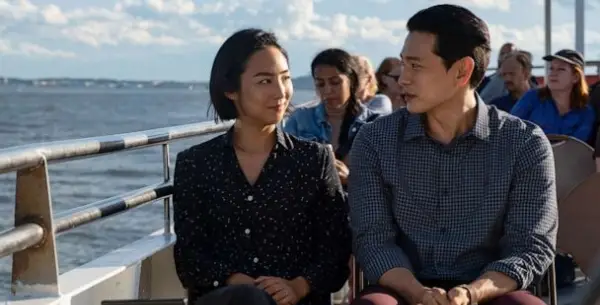PAST LIVES: A Stunning Story of Fate from Celine Song

Tynan loves nagging all his friends to watch classic movies…
I’ll admit that in our modern world and hyperactive lifestyles full of constant distractions and competing spectacles, I’m thankful I was able to watch Past Lives the old-fashioned way. I sat there in the dark with other strangers uninterrupted by the chaos of the day. It was an uneventful weekday after hours with no baggage or preconceptions. And I sat there prepared to imbibe what it had to offer.
The movie is the epitome of contemplative, meditative cinema. In a different context, under different circumstances, I can see the spell of the movie being neutralized by the surrounding chaos. As is, I was met head-on by what it had to offer.
The opening scene almost feels like a mini Godfather moment. The golden hue of the lighting, the camera slowly moving toward a subject in the foreground as voices offscreen speak so we can hear them. It’s a brilliant device to set up the scenario. A male and a female chat back and forth. They’re people watching from the opposite side of a bar as a Korean man, a Korean woman, and another white man sit together in quiet conversation. What a strange trio they make.
It’s true that in such moments there are so many stories you could draw up to try and justify the scenario. Celine Song takes an entire movie to explain the real version to us.
The heart of her film opens with two young kids in South Korea. They’re competitive when it comes to their grades, always dueling between being 1st and 2nd in their class. Hae Sung makes Na Young cry by beating her out one day, but regardless, they always walk home from school together. They haven’t quite figured out what romance is, but there’s a closeness between them. They’re fast friends.
However, when her dad decides to immigrate overseas, “Nora” must relinquish this friendship for whatever the future holds. In camera, we watch their diverging paths as they trudge their separate ways. She will go first to Canada, and then America to seek out her dream of winning the Nobel Prize. He will stay behind in Korea.

Song‘s use of time is self-assured and brazen. She’s loose and elastic with it, bravely allowing her story to move, first, 24 years into the past, before fast-forwarding 12 years and then 12 years again. But these jumps in time feel subtle and right with the perfectly applied sense of space and context. We never feel like we’re being rushed; the elliptical nature of a single cut is imbued with so much power.
They reconnect by chance 12 years later, thanks to Facebook, and rekindle a friendship over Skype. This specific moment in time feels intentional. Long-distance friendships or even relationships are hampered by shoddy technology. What we have now cannot totally replace in-person interaction — we all know that — but it’s lightyears ahead of what we had even a decade ago.
Nora’s life is taking her into the literature circles of New York including a writer’s retreat for up-and-coming talent. He is attending a good school in Korea. They’re amazed to see each other: they’re changed and yet nothing has changed between them. If you’ve ever had a similar experience you know this paradox to be true.
A Lesson in In-Yun
Song conjures up this idea of In-Yun, or relational destiny, which infuses Korean culture and implies something between people in their past lives together. In modernity, it might only be construed as a pickup line, but for the sincere, starry-eyed souls it might just carry some weight and lend a sense of comfort. Any interpersonal connection may apply.
However, there is a sense that Hae Sung (Teo Yoo) and Nora (Greta Lee) are in their very specific orbits, and they are not prepared to fight the inertia around them. Nora takes the first step and asks to stop their online rendezvous. It’s too painful to live in uncertainty with little hope of change. She takes a leap of faith in her career meeting fellow writers with similar ambitions. One of them is named Arthur (John Magaro). Their trajectories are leading them in the same direction and so eventually they get married.
Lying in bed together, having a late-night conversation on the edge of consciousness, Arthur asks her one of those what-if questions about where she ended up. She responds matter-of-factly, “This is my life.” She seems satisfied with that. Her husband admits something else to her.
Sometimes he hears her talk in Korean while she’s sleeping. It’s heartbreaking to hear him admit that she dreams in a language he can’t understand. It’s not wrong nor does it mean they can’t make their way together, but it matters to him. Because he wants to know her intimately. It’s important to him.
I have issues with Lost in Translation, but there is something about that film that sticks with me — the loneliness and the malaise — as much as the Tokyo streets I dearly love. As best as I can describe it, Past Lives is born out of this same tradition. There’s a delicacy and dignity to these people. It could bend so many directions — choose so many roads — and in the end, somehow it chooses the bravest one.
In another film, in another world, maybe in a past life, there could be a passionate love affair between two people who seemed destined to be together. These are the stories our culture seems to eat up because they make us feel good and vindicate our desires to live out our best lives — the lives that make us feel the most validated regardless of how it affects other people.
Or it could be a sordid melodrama where the Korean couple crosses time and space and the white spouse is cast off like the cultural patriarchy readily pulling them apart. The movie wryly acknowledges this narrative trope. Of course, none of this is true to what actually happens.
A Different Kind of Story
Past Lives foregoes all of these ideas while simultaneously tapping into the longings many of us have deep in our hearts while still allowing them to play out in meaningful reality. It feels true and right; like the way things are meant to be. We can see this story occurring naturally with genuine people. And the emotions engendered feel equally beautiful.
Of course, 12 years after they broke off their internet relationship Hae Sung finally comes to the U.S. — to New York. Ostensibly it’s for some rest and relaxation, but everyone knows his only reason for being there is to see Na Young again. Their reunion is pregnant with all sorts of import, and they visit the Statue of Liberty together surrounded by a sea of couples.

Just imagine how it is when he finally meets the man Nora ended up marrying. Uncomfortable doesn’t even begin to describe it. There’s so much more here.
I could write a whole exploration of code-switching and cross-cultural communication, international dialogue, and subtitles in film. However, I will only say Past Lives replicates the joys and genuine struggles of existing in this world in-between cultures and languages.
Greta Lee is such a phenomenal conduit of this drama, and she takes every scene with a self-assured composure full of warmth and feeling. Teo Yoo has a forthright candor morphing from a boyish heartthrob into a man still grappling with unresolved feelings.
John Magaro could easily be a whiny-voiced annoyance — the great white evil of the movie — and yet it’s a credit to his humanity that we like him, even empathize with him (especially if we don’t speak Korean). It’s almost like we’re there sitting at the bar in what feels like a private conversation that we barely understand. It feels a bit awkward, but there can also be a connection there. If you will, it’s in-yun.
Conclusion: Past Lives
Nora cries at the end of the movie. Her husband takes her in his arms as they walk back up the steps to their apartment. The perceptiveness of this moment is one that cannot be simply attributed or articulated. I don’t have the capacity to totally explain what emotions have come to the fore. All I know is that they are there. It’s perplexing, but in the way I like my movies to be.
In Lost in Translation, I’ll never know what Bill Murray whispered to Scarlett Johansson. Here we’ll never know what could have happened or why she’s crying exactly. Maybe she doesn’t even know herself. But living out that ambiguity feels key and ultimately true to the human experience.
We’re always looking to discern what our future will be. Religious people question God’s plan for their lives. And often we have the nagging thoughts about how things could have been if only certain things were different. Perhaps I’m the only one who thinks this way. But Past Lives seems to suggest this is not the case. I’m still mulling over the movie, but I’m glad I saw it. Hopefully, you will be too.
Past Lives was originally released in the U.S. on June 2, 2023.
Watch Past Lives
Does content like this matter to you?
Become a Member and support film journalism. Unlock access to all of Film Inquiry`s great articles. Join a community of like-minded readers who are passionate about cinema - get access to our private members Network, give back to independent filmmakers, and more.
Tynan loves nagging all his friends to watch classic movies with him. Follow his frequent musings at Film Inquiry and on his blog 4 Star Films. Soli Deo Gloria.













